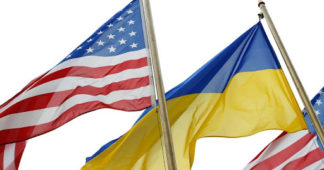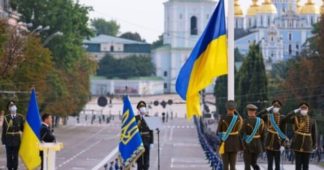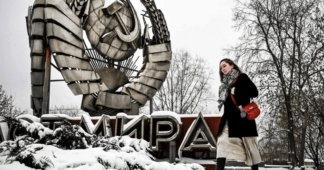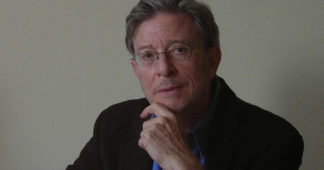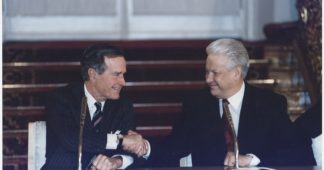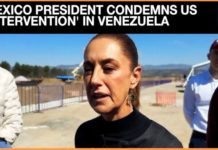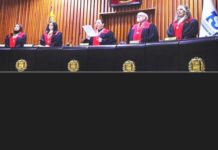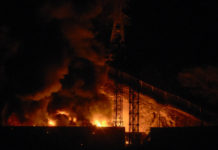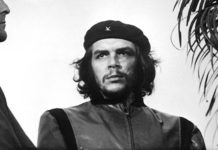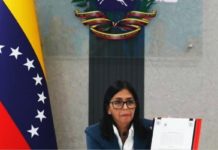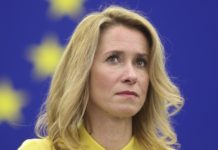part 1 / 2
By Dimitris Konstantakopoulos
Thirty years after the dissolution of the USSR, Sergey Yurievich Glaziev speaks about the failure of Perestroika, the results of the introduction of capitalism in ex-USSR, the Chinese way and future prospects for Russia and the Eurasian Union.
Thirty years ago, in December 1991, the President of Russia, ex-member of the Politburo of the Central Committee of the CPSU, Boris Yeltsin, took the initiative to dissolve the Soviet Union, with the support of the Presidents of Ukraine, Belarus and, of course, the United States of America. The three Presidents dissolved the USSR without taking into account the expressed will of the great majority of its citizens, who voted against the dissolution of their country in the referendum of March 1991. By dissolving the USSR, the three Presidents opened the door wide open to the introduction and domination of Capitalism in the ex-USSR, to the extension of NATO deep into the Soviet territory, to the advent of capitalist Globalization worldwide and to an avalanche of wars in the Balkans, in the USSR itself, in the Middle East and in Africa which followed, many of which continue to our day, all of which were made possible by the dissolution of USSR. The disappearance of the USSR along with the other socialist states of Eastern Europe has also created very favorable conditions for the demolition of the welfare state in Western Europe.
This dissolution could not have taken place if it was not preceded by the supposed “coup” of August 1991. We say “supposed”, because the coup plotters, who were among the legal Soviet government (with the exception of Gorbachev, whose role to this day remains rather unclear), did nothing except declare their intention to impose a state of emergency. They gave full freedom of movement and communication to Yeltsin, whom nobody tried to arrest, permitting him to present himself as a great hero and defender of “democracy” and to use even the Soviet TV for this purpose. Through this operation, Yeltsin was able to steal the powers of the Soviet authorities, neutralize any resistance in the military and security forces, ban the Communist Party and proceed to the culmination of his very real coup d’état with the dissolution of the USSR and the program of “shock therapy” (January 1992) by which all central planning mechanisms were abolished and most of the Russian population was suddenly pauperized. Two years later, in 1993, Yeltsin has bombed the Russian parliament, with the encouragement and applause of the delighted by all that US President Clinton and all other supposed democratic Western leaders, in order to open the way to the privatization of the Soviet state property, which proved to be the greatest looting of all times and all places in History.
Three years after the events of August 1991, an article by Samuel Hearsh did not leave any serious doubt that Western secret services had the supervision of all this “August coup by hardliners” and took care to ensure the smooth evolution of events. We believe all that would be impossible to happen if a considerable part of the Soviet state and party nomenclatura, in critical positions, had not developed long ago extensive cooperation with Western forces. The perpetrators of the supposed August 1991 coup were amnestied under Yeltsin. General Varennikov refused to be pardoned and he was finally acquitted by the Supreme Court of Russia.
We discussed the August 1991 “coup”, the reasons for the failure of Gorbachev’s reforms and the prospects of Russia, the Eurasian Union and world economy with the Russian academician Professor Sergei Glaziev. Professor Glaziev, in his capacity as an advisor of President Putin, has been the architect of the Eurasian Union, regrouping a number of ex-Soviet Republics. He is an important Russian intellectual and politician, member of the Russian Academy of Sciences, a renowned specialist in Kondratieff’s long economic cycles and an influential opinion leader with leftist views in post-communist Russia. Our interview with him took place last August.
Part two of the interview will follow tomorrow.
D.K.
Thirty years have passed since the August 1991 coup, if it really was one, which opened the way for the dissolution of the USSR, but still, many things remain unclear about it. Do you believe it was a real coup and if it was why it failed so miserably? Why did the State Committee on the State of Emergency (GkChP) not arrest Yeltsin and let him present himself as a hero of a “democratic revolution”? What was Gorbachev’s role?
(Note: The State Committee on the State of Emergency, ГКЧП in Russian, was created on August 19th 1991 and was comprised of eight members, the Soviet Vice President Gennady Yanayev, Premier Valentin Pavlov, Interior Minister Boris Pugo, Defense Minister Marshal Yazov, Chairman of the KGB Vladimir Kryuchkov, First Deputy Chairman of the Defense Council Oleg Baklanov, Chairman of the Peasants’ Union Vasily Starodubtsev and President of the Association of State Enterprises Aleksandr Tizyakov- DK.)
Unfortunately, none of the members of the State Emergency Committee is now alive, so there is no one to answer your question. I can only express my subjective opinion based on the following facts.
Almost the entire party and economic elite of the country supported the GKChP. All the regional committees of the CPSU and the Soviets of People’s Deputies expressed their support for the preservation of the USSR and the socialist system, sending telegrams to Moscow in support of the GKChP with demands to put an end to the rocking of the situation and the collapse of the country. The KGB, whose head was one of the members of the GKChP, had all the opportunities and grounds to arrest Yeltsin. KGB special forces tracked all Yeltsin’s movements as he drove from his suburban dacha to the House of Soviets. But the problem was that these people had no desire to seize power. They had no plan of action, no determination to take control of the situation. They did not plan a coup d’ etat, they were just seeking to preserve Soviet statehood. Having declared a state of emergency and having sent troops to Moscow, they flew to Gorbachev for a political solution. But Yeltsin had a clear plan to usurp power and he used every minute of delay on the part of the State Emergency Committee to strengthen his position. I know for sure that he and his entourage were trembling with fear, sitting in the bunker of the (Russian) House of Soviets waiting for the assault. In this case, there was an urgent evacuation plan to the US Embassy, which was located nearby. Next to him were Burbulis and Gaidar, who later headed the first independent government of Russia, as for the acting government of the RSFSR (Russian Federation), headed by Silayev, mostly fled. (Note: Bourboulis held several high positions in the first Russian government, including Secretary of State, and was one of the drafters and signers of the Belavezha Accords to dissolve the USSR. He was one of the main architects of Russian political and economic “reform”, whose effect on the Russian economy was comparable to the effect of the 2nd World War. He was probably the main person assuring the contact between Yeltsin and US special services. Gaidar has also played a central role in the destruction of Russian/Soviet economy and he was a staunch supporter of the bombing of the Russian Parliament in 1993 – DK.)
Probably, the GKChP was preceded by some kind of political provocation by Gorbachev. Having gone on vacation to the Crimea, he apparently gave an unspoken command or consent to “tighten the screws” to the loose mechanism of Soviet statehood. Something like a word “try to restore order”, which was understood by the hawks that he will support their decisive actions. It is still not completely clear who was the leader and inspirer of the GKChP. Some of its members, such as Starodubtsev or Baklanov, were included in it “for the company”. Starodubtsev said that he had received a call the day before and was asked to “speak for the peasants.” None of the members of the GKChP showed the political will to make a decision on the use of force against Yeltsin and his supporters, who seized the initiative and, having gathered several thousand of their supporters around the House of Soviets, in fact, they themselves launched a coup d’ etat. A ferment began among the military, some of the military commanders brought to Moscow began to move to Yeltsin’s side. The members of the State Emergency Committee were waiting for a political decision from Gorbachev, who for some reason had been locked up in his residence in the Crimea.
Gorbachev, having learned that a crowd of activists supporting Yeltsin had gathered in Moscow, which it was impossible to disperse without victims, was frightened and accused the members of the GKChP of trying to usurp power. Yeltsin took advantage of his indecision and declared himself the winner and savior of the nascent “democracy”. He seized the leadership and began a rapid seizure of power.
Do you believe that US and/or other foreign services played a role in the events of 1991 and, in more general terms, in the launching and subsequent direction of perestroika?
There was no direct involvement of the US or other special services in the events of 1991. But, as the US writer Peter Schweitzer convincingly writes in his book “Victory”, their role was decisive. Without the consistent policy of the American special services to undermine the Soviet statehood, the collapse of the USSR probably would not have happened. In this book, the head of the CIA admits the existence of a plan for the collapse of the USSR, developed by him on direct instructions of US President Ronald Reagan. The most striking events implemented according to this plan are well known: the downing of a Korean passenger plane that violated the airspace of the USSR, followed by the dismissal of the leadership of the Armed Force who resisted Gorbachev’s policies. Then we had a demonstrative flight through the territory of the USSR with a landing on the Red Square of Mathias Rust, followed by another purge of the leadership of the military. Provocations in the Baltic States and the Caucasus, fanning national discord and encouraging separatists-the CIA was behind all this. The biggest achievement of the American special services was the recruitment of Yeltsin. Today, at the headquarters of the National Democratic Institute for International Affairs in Washington, you can see a permanent exhibition of the “achievements” of this institute in ensuring the election of Yeltsin as president of the RSFSR in 1991. In fact, the entire campaign, the publication of leaflets, the preparation of publications, and Yeltsin’s PR firm were led by American advisers. Flattering and glorifying Gorbachev in every possible way, the Americans were preparing a stab in his back, raising Yeltsin to seize power in the fall of 1991.
How Americans led Gorbachev to disaster
Let us return for a while to the origins of perestroika. What was the intention and the project of Gorbachev and of the advisors who influenced him mostly when they launched perestroika and glasnost?
As it now turns out, US agents, and first of all, Yakovlev and Shevardnadze, consistently led Gorbachev to disaster. Taking advantage of his incredible vanity, they inspired him with simple ideas about democratization and glasnost, created for him the cult of the messiah, designed to lead the USSR to the “main road of human development”. The meaningless slogans “socialism with a human face”, “more democracy, more socialism”, “Perestroika” were intended to stupefy his own and public consciousness. Gorbachev was particularly impressed by his triumphant trips to Western countries, where he was greeted as the greatest hero of our time. He fancied himself a Prophet, saving the world from disaster. In several steps, he carried out a personnel purge in the central organs of the party, ensuring that the majority consisted of his supporters. But as a person with little education and no ideas, he could not formulate a clear strategy and he followed the lead of his chief adviser and American agent Yakovlev. The US State Department celebrated Yakovlev’s election to the Politburo as an outstanding victory.
You say Yakovlev, Shevardnadze and Yeltsin were US agents. On what grounds are you basing such assertions? And even if we accept that this was the case, it remains quite astonishing that they were able to be elected to Politburo and even define the general direction of the policy followed. How did this become possible? I am wondering if they had not already acquired the cooperation of a much larger section inside the soviet nomenclatura and party – state mechanisms which was aspiring into destroying the Soviet system and making Russia a part of the West at any cost.
This is really the most mysterious question. Why did neither the KGB, nor the Central Committee of the CPSU, nor the Party Control Committee stop the nomination of these agents of influence? In relation to Yeltsin, everyone knows that his presidential election campaign of 1991 was organized and financed from the funds of the US State Department and the CIA by visiting the headquarters of two international institutions – the National Democratic Institute and the International Republican Institute. There is a permanent exhibition of the contribution of these institutions to that election campaign, including campaign materials. Why the KGB of the USSR allowed direct interference of these American political centers in the elections in the RSFSR is a big mystery. Gavril Popov, who was an active participant in those events, having been elected mayor of Moscow at the same time, believes that there was a “conspiracy of special services”: the KGB leadership interacted with the CIA, hatching a plan to usurp power as a result of the conflict between Yeltsin and Gorbachev. But when they tried to do this by organizing the State Emergency Committee, instead of removing them both from power, they got scared at the last moment and ran to negotiate with Gorbachev, leaving Yeltsin to celebrate the victory in Moscow.
Regarding Yakovlev, who was considered the main inspiration, the “foreman” of Perestroika, there are a lot of publications about his friendship with prominent American figures and even about his recruitment by the CIA, which would have taken place during his internship at Columbia University. The deceased A. Nagorny, who worked for a long time at the Institute of the USA and Canada, said that their American colleagues celebrated Yakovlev’s election to the Politburo of the CPSU as their greatest achievement. Everything is also clear with Shevardnadze as the Soviet Minister of Foreign Affairs has actually pursued a pro-American policy, including the unmotivated transfer of a significant part of the disputed territory in the Bering Sea region to the United States by signing an international treaty that was never ratified by either the USSR or the Russian Federation.
But I do not think that there was any conspiracy in the depths of the Soviet party nomenclature to destroy the USSR. It is also unlikely that Gorbachev and even Shevardnadze wanted this. It’s just that the Americans were playing on many boards at the same time: they were praising and praising Gorbachev with all their might, playing on his vanity and pushing their agents of influence through him to high posts; in parallel, they were preparing his grave, processing and preparing for the seizure of power of his personal enemy Yeltsin, who, out of an animal thirst for power was ready to sell the country and the party to any enemy for the promise of becoming a Gauleiter (Note: Gauleiter was the name of the political officials governing a given district under Nazi rule – DK.). At the same time, they helped separatist movements in other republics by organizing headquarters structures of local nationalists in the Baltic States and the Caucasus; they organized a huge number of training programs and trips to internships, various courses and conferences for many thousands of active young people, treating them in the right spirit and educating them to be agents of influence. At the same time, if the strategy of American political strategists in relation to Gorbachev was to stupefy and weaken his leadership and (Soviet) Union authorities, then Yeltsin sold out to them and they completely controlled his inner circle, selected cadres who were to begin immediate reforms after the seizure of power. And these cadres immediately after the failure of the GKChP entered into a battle with the Union authorities: ministries were seized, party organizations were dissolved, binding decisions were made on behalf of the Russian authorities. Under the Central Committee of the CPSU, the Government of the USSR, including the KGB and other law enforcement agencies, were in a kind of stupor, conceding power to young reformers who acted outside legality solely on the basis of Yeltsin’s instructions.
The management system created by Stalin, considerably shaken by Khrushchev and rotted under Brezhnev, was over-centralized and could not survive the betrayal and incompetence of the top leadership. Senior officials were not used to taking responsibility by themselves, they have never fought for power, but seeped into it by building personal ties with their superiors. They lost touch with the people and were afraid of them, not daring to use force against the crowd. Without receiving clear instructions from Gorbachev, they drifted with the flow until they fell into the abyss along with the entire CPSU and the USSR. And, of course, the main reason for this collapse was the loss of faith in communist ideals, distrust of the slogans of communist propaganda, growing hatred of the party nomenclature and bureaucracy, the disappointment of the thinking part of the population from the leadership of the CPSU, which lost control over the Perestroika launched by it.
Published at uwidata.com
